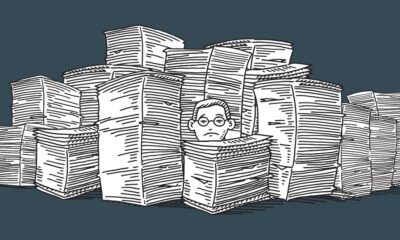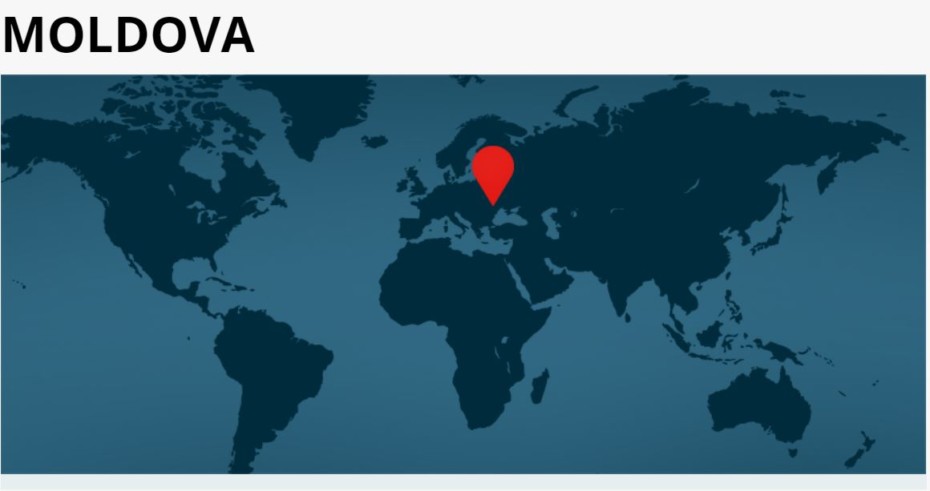
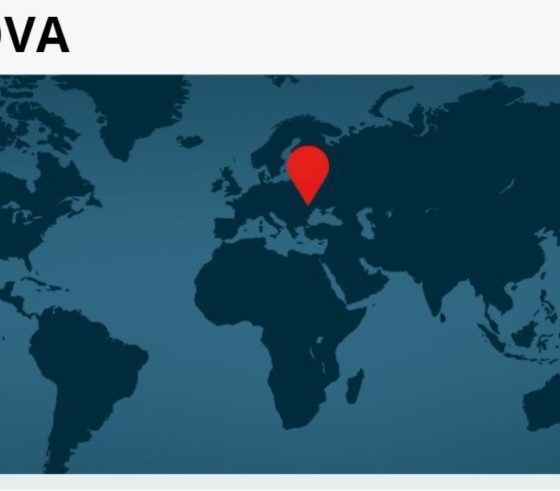
Politics
2019 in retrospect: Moldova’s politics in international media
In 2019, important political events happened in the Republic of Moldova: the country has changed 3 governments, it went through political and social crises, it has gained and lost the trust of international partners, etc. The most crucial events were reported not only by the biggest national media institutions but also drew the attention of international news channels. This is why, the end of the year is the proper time for a retrospection of these events and the way they were described by the top media outlets in the world.
Filat’s son ordered to pay £466,000
The year commenced with news about Luca Filat, the son of the former prime minister (PM), Vladimir Filat, who has been ordered “to hand over nearly £500,000 following a corruption investigation by the National Crime Agency,” The Guardian informed.
The media outlet wrote, at that moment, that the Luca’s accounts and expenses were funded by large deposits from overseas companies, including from Turkey and the Cayman Islands and that his accounts were hit with freezing orders in May 2018.
Parliamentary elections
On the eve of the parliamentary elections in Moldova on February 24, Associated Press (AP) News wrote about the close battle of the political powers of that moment: “No outright winner is expected and the ballot will likely deepen a rift between pro-Western and pro-Russian forces, amid concerns about endemic corruption and crumbling democracy.”
“There are three main parties: The Democratic Party, which heads the ruling coalition together with its junior partner the Popular European Party, the Socialists, who favour closer ties to Russia, and the pro-European ACUM which opposes both major parties and signed a pledge Thursday not to enter into a coalition with them if no party wins an outright majority,” explained AP News.
A special attention was paid to Ilan Șor – the leader of the “Șor” Party, who was just about to get elected, even though he was involved in a $1 billion bank fraud and was sentenced to seven years and a half in jail, as a Bloomberg article informed the world.
The forecasts were legitimate, thus became true. “Moldova’s election has produced a hung parliament, splitting the vote between pro-Western and pro-Russian forces at a time when the ex-Soviet republic’s relations with the European Union have soured,” commented Euronews after the elections.
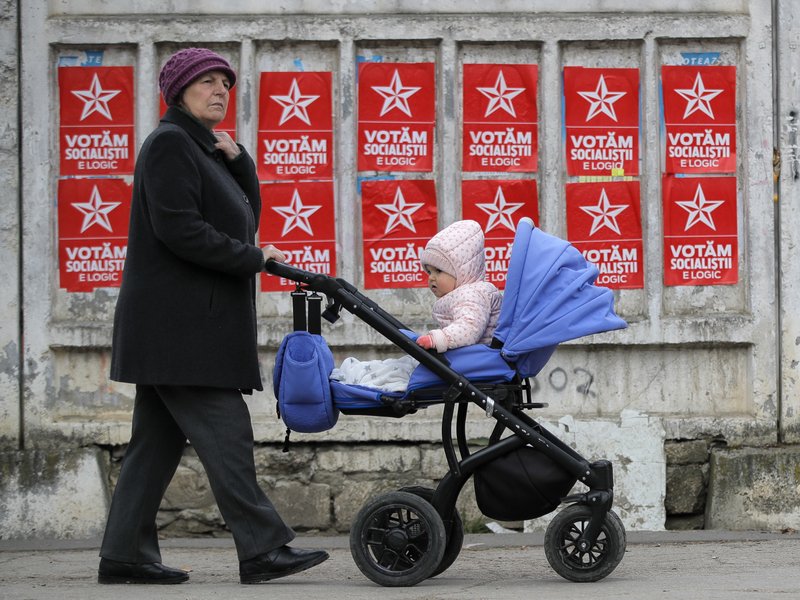
Photo: Vadim Ghirda
According to the result of the parliamentary elections, 3 political parties (the Party of Socialists of the Republic of Moldova – PSRM, the Democratic Party of Moldova – DPM and the “Șor” Party), 1 electoral bloc (ACUM) and 3 independent candidates were granted access in the Parliament.
A new government
After 3 months of uncertainty and unwillingness to cooperate, the parliament approved a new government based on an unprecedented alliance between pro-Russian and pro-European forces, as the Al Jazeera portal notified. “The Socialist Party of then-president Igor Dodon agreed to work with the pro-European ACUM alliance and freeze out the previously ruling Democratic Party, led by the powerful oligarch Vlad Plahotniuc,” the portal informed.
“The development was welcomed by foreign observers, but the Democrats, who were in power before the February election, opposed it, calling on their supporters to start street protests. They accused their rivals of trying to usurp power and surrender Moldova to Russia,” RT told its public.
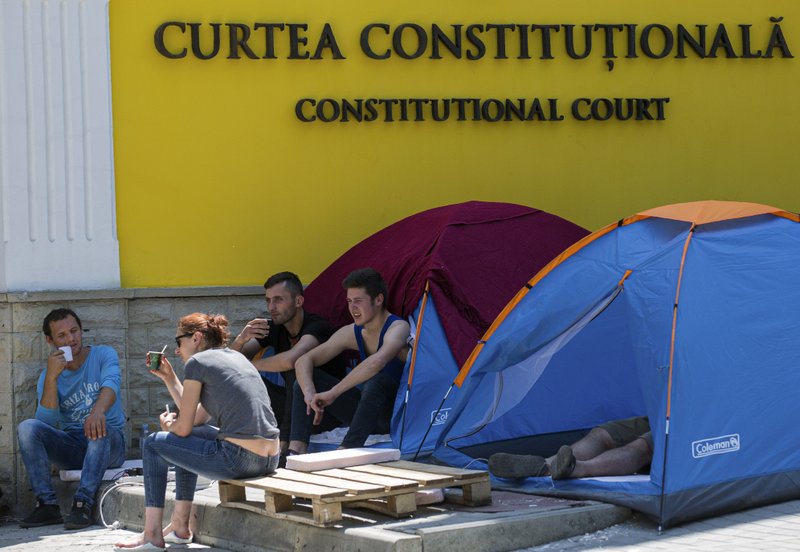
Protesters at Constitutional Court| Photo: Roveliu Buga
An even heavier political crisis began when the Constitutional Court suspended President Igor Dodon and appointed ex-PM Pavel Filip as interim leader, who called for September snap vote. “The new acting president dissolved parliament and called elections just after legislators appeared to have formed a government following months of wrangling,” reported Al Jazeera.
“This sort of manipulation is exactly why Moldova’s other parties, though sharply at odds over the country’s geopolitical orientation, found it more important to jointly take on Mr. Plahotniuc. They plan to restore independence to the court system and the national electoral commission, and reverse electoral law changes made to favor Mr. Plahotniuc. Then it would be possible to hold a new election,” The Washington Post claimed.
The international media reports finally became more optimistic: “Moldova now has a fragile chance to cleanse its political system. […] If the reform succeeds, Moldova would bolster an encouraging anti-corruption wave in its region,” was written in the same article of The Washington Post.
Maia Sandu, the newly appointed Prime Minister of Moldova, announced that Moldova is finally free and can fight corruption, sack dishonest officials, make the electoral system fairer and get foreign aid flowing. Reuters wrote the following: “Moldova’s new prime minister Maia Sandu consolidated her power on Friday as her predecessor resigned, appearing to ease a crisis that shook the country for the past week as two rival governments jostled for control.”
“We are in the process of liberating this captured state. The servants of the Plahotniuc regime are leaving, one after the other,” she declared in an interview for Deutsche Welle.
Later on, all six judges at Moldova’s Constitutional Court, whose decisions have fuelled the political crisis, have resigned, as AP News announced. What’s more, the Anti-Corruption Prosecutor’s Office in Moldova seized assets of the former DPM leader, Vlad Plahotniuc, worth 55 million lei, Plahotniuc being investigated in two cases of large-scale money laundering, as Balkan Insight reported.
A new government (version 2.0)
Despite all the efforts to keep the PSRM and ACUM coalition together, the international media could observe the deep divergences between their ideologies. “It’s as if they are trying to have it every way with everyone — telling the West what it wants to hear via Ms. Sandu while Mr. Dodon plays directly to Russia,” was writing The Washington Times in September.
The delay-action bomb exploded anyway and Reuters along with other media publications announced the entire world in November: “A no-confidence vote brought down Moldova’s government threatening more instability just five months after pro-Western Prime Minister Maia Sandu took office promising to fight corruption.”
“The coalition has tussled over who should have the power to appoint a new prosecutor general. Sandu wanted to be able to make the choice herself, but the Socialists wanted a special commission under the justice ministry to decide,” it is explained in the same Reuters article.
“Sandu wanted an independent candidate who would crack down on corruption and organised crime. But she was unable to push this through against resistance from the old cliques, including the Socialists, who insisted that not the prime minister but a Justice Ministry commission should take the decision on the appointment,” added Deutsche Welle.

Protesters in Chisinau demonstrated against Sandu’s ouster| source: DW/Y Semenowa
Dodon said, as Reuters reported, that the Socialists would try to run a minority government if ACUM and PSRM could not compromise on a new prime minister candidacy.
The next day, the same media institution announced that “the Moldovan President Igor Dodon nominated former finance minister Ion Chicu to be the next prime minister in what is likely to be a Socialist Party-backed minority government following the collapse of the ruling coalition.”
“Now, the only strongman left in Moldova is President Igor Dodon. […] The speed at which he installed the new government is mind-boggling. There is reason to believe that he had been pulling strings in the background for some time, negotiating with the Democratic Party about toppling the Sandu government and setting up a new Cabinet,” said Deutsche Welle.
Even though the new PM Ion Chicu emphasized that his Cabinet had no political attachments, more than half of the 11 ministers in the new government, including Chicu, are former advisers to Russia-backed President Igor Dodon, as AP News disclosed.
In the shadow of the new government, “Moldova’s new prime minister raised the possibility of a “pause” in its cooperation with the International Monetary Fund, a day after he said his ex-Soviet republic was negotiating a $500 million loan with Russia,” Reuters reported. The future of the EU disbursements in the budget of Moldova, as a support assistance to help deliver much needed reforms, is also uncertain, as the disbursement were initially granted to the Government led by Maia Sandu.
Therefore, as Reuters claimed, the new old socialist government suggests a likely pivot back towards Russia.
Photo: ipi.media
Society
“They are not needy, but they need help”. How Moldovan volunteers try to create a safe environment for the Ukrainian refugees

At the Government’s ground floor, the phones ring constantly, the laptop screens never reach standby. In one corner of the room there is a logistics planning meeting, someone has a call on Zoom with partners and donors, someone else finally managed to take a cookie and make some coffee. Everyone is exhausted and have sleepy red eyes, but the volunteers still have a lot of energy and dedication to help in creating a safe place for the Ukrainian refugees.
“It’s like a continuous bustle just so you won’t read the news. You get home sometimes and you don’t have time for news, and that somehow helps. It’s a kind of solidarity and mutual support,” says Vlada Ciobanu, volunteer responsible for communication and fundraising.
The volunteers group was formed from the very first day of war. A Facebook page was created, where all types of messages immediately started to flow: “I offer accommodation”, “I want to help”, “I want to get involved”, “Where can I bring the products?”, “I have a car and I can go to the customs”. Soon, the authorities also started asking for volunteers’ support. Now they all work together, coordinate activities and try to find solutions to the most difficult problems.
Is accommodation needed for 10, 200 or 800 people? Do you need transportation to the customs? Does anyone want to deliver 3 tons of apples and does not know where? Do you need medicine or mobile toilets? All these questions require prompt answers and actions. Blankets, sheets, diapers, hygiene products, food, clothes – people bring everything, and someone needs to quickly find ways of delivering them to those who need them.
Sometimes this collaboration is difficult, involves a lot of bureaucracy, and it can be difficult to get answers on time. “Republic of Moldova has never faced such a large influx of refugees and, probably because nobody thought this could happen, a mechanism of this kind of crisis has not been developed. Due to the absence of such a mechanism that the state should have created, we, the volunteers, intervened and tried to help in a practical way for the spontaneous and on the sport solutions of the problems,” mentions Ecaterina Luțișina, volunteer responsible for the refugees’ accommodation.
Ana Maria Popa, one of the founders of the group “Help Ukrainians in Moldova/SOS Українці Молдовa” says that the toughest thing is to find time and have a clear mind in managing different procedures, although things still happen somehow naturally. Everyone is ready to intervene and help, to take on more responsibilities and to act immediately when needed. The biggest challenges arise when it is necessary to accommodate large families, people with special needs, for which alternative solutions must be identified.
Goods and donations
The volunteers try to cope with the high flow of requests for both accommodation and products of all kinds. “It came to me as a shock and a panic when I found out that both mothers who are now in Ukraine, as well as those who found refuge in our country are losing their milk because of stress. We are trying to fill an enormous need for milk powder, for which the demand is high and the stocks are decreasing”, says Steliana, the volunteer responsible for the distribution of goods from the donation centers.
Several centers have been set up to collect donations in all regions of Chisinau, and volunteers are redirecting the goods to where the refugees are. A system for processing and monitoring donations has already been established, while the volunteer drivers take over the order only according to a unique code.
Volunteers from the collection centers also do the inventory – the donated goods and the distributed goods. The rest is transported to Vatra deposit, from where it is distributed to the placement centers where more than 50 refugees are housed.
When they want to donate goods, but they don’t know what would be needed, people are urged to put themselves in the position of refugees and ask themselves what would they need most if they wake up overnight and have to hurriedly pack their bags and run away. Steliana wants to emphasise that “these people are not needy, but these people need help. They did not choose to end up in this situation.”
Furthermore, the volunteer Cristina Sîrbu seeks to identify producers and negotiate prices for products needed by refugees, thus mediating the procurement process for NGOs with which she collaborates, such as Caritas, World Children’s Fund, Polish Solidarity Fund, Lifting hands, Peace Corps and others.
One of the challenges she is facing now is the identifying a mattress manufacturer in the West, because the Moldovan mattress manufacturer that has been helping so far no longer has polyurethane, a raw material usually imported from Russia and Ukraine.
Cristina also needs to find solutions for the needs of the volunteer groups – phones, laptops, gsm connection and internet for a good carrying out of activities.
Hate messages
The most difficult thing for the communication team is to manage the hate messages on the social networks, which started to appear more often. “Even if there is some sort of dissatisfaction from the Ukrainian refugees and those who offer help, we live now in a very diverse society, there are different kind of people, and we act very differently under stress,” said Vlada Ciobanu.
Translation by Cătălina Bîrsanu
Important
#WorldForUkraine – a map that shows the magnitude of the world’s actions against Russian aggression

The international community and volunteers from all over te world have launched #WorldForUkraine as a platform that shows the magnitude of the world’s actions against the Russian aggression. In a digital world – it is an interactive map of public support of Ukrainians under the hashtag #WorldForUkraine – rallies, flash mobs, protests around the world. In the physical dimension – it is your opportunity to take to the streets and declare: “No to Putin’s aggression, no to war.”
„Today, along with the political and military support, emotional connection with the civilized world and truthful information are extremely important for Ukraine. The power to do it is in your hands. Join the #WorldForUkraine project and contribute to the victorious battle against the bloodshed inflicted on Ukraine by the aggression of the Russian Federation”, says the „about the project” section of the platform.
Go to the streets — Tell people — Connect and Unite — Become POWERFUL
Volunteers have launched #WorldForUkraine as a platform that shows the magnitude of the world’s actions against Russian aggression. In digital world – it is an INTERACTIVE MAP of public support of Ukrainians worldforukraine.net under the hashtag #WorldForUkraine – rallies, flash mobs, protests around the world. In the physical dimension – it is your opportunity to take to the streets and declare: “No to Putin’s aggression, no to war.” There you may find information about past and future rallies in your city in support of Ukraine. This is a permanent platform for Ukrainian diaspora and people all over the world concerned about the situation in Ukraine.
So here’s a couple of things you could do yourself to help:
* if there is a political rally in your city, then participate in it and write about it on social media with geolocation and the hashtag #WorldForUkraine
* if there are no rallies nearby, organize one in support of Ukraine yourself, write about it on social media with geolocation adding the hashtag #WorldForUkraine
The map will add information about gathering by #WorldForUkraine AUTOMATICALLY
Your voice now stronger THAN ever
All rallies are already here: https://worldforukraine.net
Important
How is Moldova managing the big influx of Ukrainian refugees? The authorities’ plan, explained

From 24th to 28th of February, 71 359 Ukrainian citizens entered the territory of Republic of Moldova. 33 173 of them left the country. As of this moment, there are 38 186 Ukrainian citizens in Moldova, who have arrived over the past 100 hours.
The Moldovan people and authorities have organized themselves quickly from the first day of war between Russia and Ukraine. However, in the event of a prolonged armed conflict and a continuous influx of Ukrainian refugees, the efforts and donations need to be efficiently managed. Thus, we inquired about Moldova’s long-term plan and the state’s capacity to receive, host, and treat a bigger number of refugees.
On February 26th, the Ministry of Labor and Social Protection of Moldova approved the Regulation of organization and functioning of the temporary Placement Center for refugees and the staffing and expenditure rules. According to the Regulation, the Centers will have the capacity of temporary hosting and feeding at least 20 persons, for a maximum of 3 months, with the possibility of extending this period. The Centers will also offer legal, social, psychological, and primary medical consultations to the refugees. The Center’s activity will be financed from budget allocations, under Article 19 of Provision no. 1 of the Exceptional Situations Commission from February 24th, 2022, and from other sources of funding that do not contravene applicable law.
The Ministry of Inner Affairs and the Government of Moldova facilitated the organization of the volunteers’ group “Moldova for Peace”. Its purpose is to receive, offer assistance and accommodation to the Ukrainian refugees. The group is still working on creating a structure, registering and contacting volunteers, etc. It does not activate under a legal umbrella.
Lilia Nenescu, one of the “Moldova for Peace” volunteers, said that the group consists of over 20 people. Other 1700 registered to volunteer by filling in this form, which is still available. The group consists of several departments:
The volunteers’ department. Its members act as fixers: they’re responsible for connecting the people in need of assistance with the appropriate department. Some of the volunteers are located in the customs points. “The Ministry of Inner Affairs sends us every day the list of the customs points where our assistance is needed, and we mobilize the volunteers”, says Lilia Nenescu.
The Goods Department manages all the goods donated by the Moldavian citizens. The donations are separated into categories: non-perishable foods and non-food supplies. The volunteers of this department sort the goods into packages to be distributed.
The Government intends to collect all the donations in four locations. The National Agency for Food Safety and the National Agency for Public Health will ensure mechanisms to confirm that all the deposited goods comply with safety and quality regulations.
The Service Department operates in 4 directions and needs the volunteer involvement of specialists in psychology, legal assistance (the majority of the refugees only have Ukrainian ID and birth certificates of their children); medical assistance; translation (a part of the refugees are not Ukrainian citizens).
According to Elena Mudrîi, the spokesperson of the Ministry of Health, so far there is no data about the number of Covid-19 positive refugees. She only mentioned two cases that needed outpatient medical assistance: a pregnant woman and the mother of a 4-day-old child.
The Accommodation Department. The volunteers are waiting for the centralized and updated information from the Ministry of Labor about the institutions offering accommodation, besides the houses offered by individuals.
The Transport Department consists of drivers organized in groups. They receive notifications about the number of people who need transportation from the customs points to the asylum centers for refugees.
The municipal authorities of Chișinău announced that the Ukrainian children refugees from the capital city will be enrolled in educational institutions. The authorities also intend to create Day-Care Centers for children, where they will be engaged in educational activities and will receive psychological assistance. Besides, the refugees from the municipal temporary accommodation centers receive individual and group counseling.
In addition to this effort, a group of volunteers consisting of Ana Gurău, Ana Popapa, and Andrei Lutenco developed, with the help of Cristian Coșneanu, the UArefugees platform, synchronized with the responses from this form. On the first day, 943 people offered their help using the form, and 110 people asked for help. According to Anna Gurău, the volunteers communicate with the Government in order to update the platform with the missing data.
Translation from Romanian by Natalia Graur












